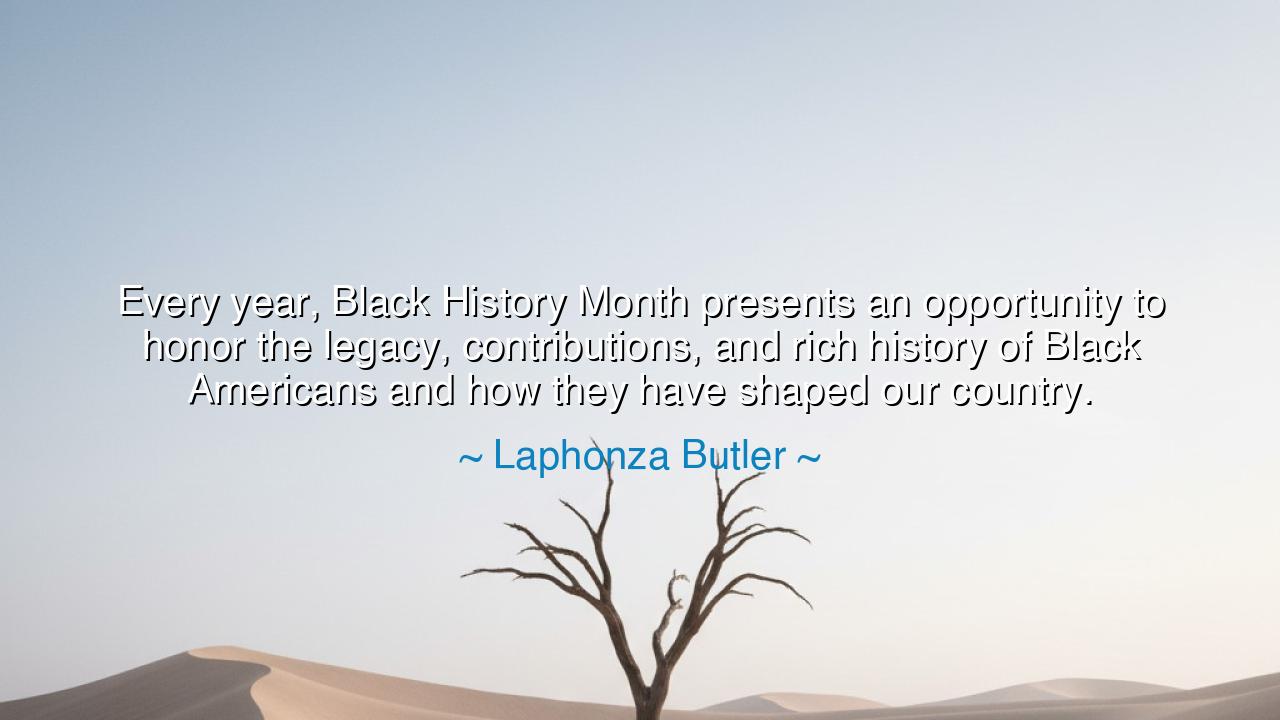
Every year, Black History Month presents an opportunity to honor
Every year, Black History Month presents an opportunity to honor the legacy, contributions, and rich history of Black Americans and how they have shaped our country.






When Laphonza Butler declared, “Every year, Black History Month presents an opportunity to honor the legacy, contributions, and rich history of Black Americans and how they have shaped our country,” she spoke with a voice that resonates like the drumbeat of generations. Her words remind us that history is not merely a record of events, but a living tapestry of courage, sacrifice, and creativity, woven by those whose stories were too often marginalized. Black History Month, she emphasizes, is more than a commemoration; it is a moment to reflect on the profound impact of Black Americans, to recognize the invisible threads that connect past struggles to present triumphs.
The origin of this quote lies in the enduring effort to acknowledge the contributions of Black Americans in a nation that has long wrestled with injustice. Black History Month itself was first celebrated in 1926 by historian Carter G. Woodson, who sought to ensure that the achievements of African Americans would not be forgotten amidst a society that often ignored or erased them. Butler’s words echo this mission: the month is an opportunity to honor legacy, to shine light on innovation, resilience, and leadership, and to understand how the efforts of Black Americans have fundamentally shaped the cultural, political, and economic fabric of the United States.
To understand the weight of Butler’s words, consider the story of Harriet Tubman, the famed conductor of the Underground Railroad. Her courage in guiding enslaved men and women to freedom was not only a heroic act of defiance, but also a shaping force in the history of the nation. Tubman’s deeds embody the essence of legacy: actions that ripple through time, influencing countless lives and inspiring generations. Black History Month is the lantern that illuminates such stories, reminding us that these contributions are not relics, but pillars of the nation’s enduring strength.
Butler’s statement also carries a philosophical truth: that history is woven from the efforts of many, not the few. Black Americans have shaped the arts, sciences, politics, and civil rights in ways that are foundational yet often overlooked. The rhythm of jazz, the innovation of Black inventors, the leadership of civil rights icons like Dr. Martin Luther King, Jr., and the courage of countless unsung heroes demonstrate that the legacy of Black Americans is inseparable from the history of the United States itself. Butler calls on us to honor this legacy, not as passive observers, but as active participants in remembrance and education.
The lesson of her words is clear: honoring history requires more than acknowledgment; it demands understanding, reflection, and action. To celebrate Black History Month is to confront the injustices of the past, to recognize resilience in the face of oppression, and to amplify the voices that have shaped society. It is an exercise in humility and gratitude, teaching us that the progress we enjoy today is built upon the sacrifices and brilliance of those who came before. In every lecture, museum exhibit, or community celebration, there lies a call to engage with history thoughtfully and intentionally.
Butler’s emphasis on contributions and legacy also encourages us to consider the interconnectedness of human endeavor. The nation’s identity, its art, its economy, and its ideals have been enriched by Black Americans. Their influence reminds us that no society thrives in isolation; greatness emerges when the wisdom, labor, and creativity of all people are acknowledged and woven together. Celebrating this history is not merely ceremonial, but a recognition that truth, justice, and progress are collective achievements.
O listener, let this wisdom guide your own journey: read the stories of Black Americans, study their contributions, and reflect on the ways in which their efforts continue to shape society. Teach the next generation not only about struggle and oppression, but also about ingenuity, resilience, and triumph. Engage with Black History Month not as a fleeting obligation, but as an opportunity to deepen understanding, foster respect, and inspire action.
In the end, Butler’s words remind us that history is alive. The legacies of Black Americans are not confined to pages or dates; they are living forces, shaping the present and guiding the future. To honor them is to acknowledge the truth of the nation’s story, to recognize the courage and creativity that built it, and to commit oneself to a world where every contribution is valued, remembered, and celebrated. Through such reflection and action, we ensure that history enlightens, empowers, and endures.






AAdministratorAdministrator
Welcome, honored guests. Please leave a comment, we will respond soon